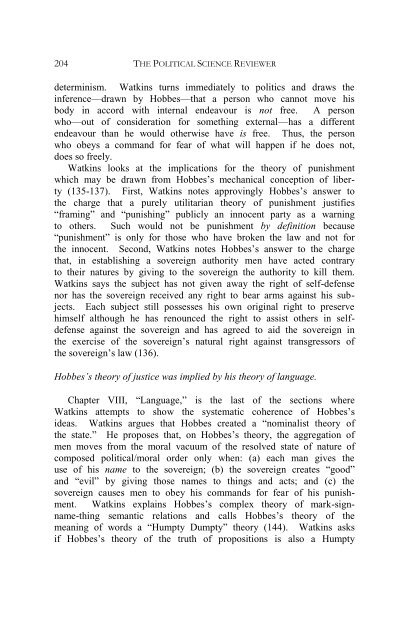Strauss and Watkins on Hobbes' Political Philosophy: A Review
Strauss and Watkins on Hobbes' Political Philosophy: A Review
Strauss and Watkins on Hobbes' Political Philosophy: A Review
Create successful ePaper yourself
Turn your PDF publications into a flip-book with our unique Google optimized e-Paper software.
204 THE POLITICAL SCIENCE REVIEWER<br />
determinism. <str<strong>on</strong>g>Watkins</str<strong>on</strong>g> turns immediately to politics <str<strong>on</strong>g>and</str<strong>on</strong>g> draws the<br />
inference—drawn by Hobbes—that a pers<strong>on</strong> who cannot move his<br />
body in accord with internal endeavour is not free. A pers<strong>on</strong><br />
who—out of c<strong>on</strong>siderati<strong>on</strong> for something external—has a different<br />
endeavour than he would otherwise have is free. Thus, the pers<strong>on</strong><br />
who obeys a comm<str<strong>on</strong>g>and</str<strong>on</strong>g> for fear of what will happen if he does not,<br />
does so freely.<br />
<str<strong>on</strong>g>Watkins</str<strong>on</strong>g> looks at the implicati<strong>on</strong>s for the theory of punishment<br />
which may be drawn from Hobbes’s mechanical c<strong>on</strong>cepti<strong>on</strong> of liber-<br />
ty (135-137). First, <str<strong>on</strong>g>Watkins</str<strong>on</strong>g> notes approvingly Hobbes’s answer to<br />
the charge that a purely utilitarian theory of punishment justifies<br />
“framing” <str<strong>on</strong>g>and</str<strong>on</strong>g> “punishing” publicly an innocent party as a warning<br />
to others. Such would not be punishment by definiti<strong>on</strong> because<br />
“punishment” is <strong>on</strong>ly for those who have broken the law <str<strong>on</strong>g>and</str<strong>on</strong>g> not for<br />
the innocent. Sec<strong>on</strong>d, <str<strong>on</strong>g>Watkins</str<strong>on</strong>g> notes Hobbes’s answer to the charge<br />
that, in establishing a sovereign authority men have acted c<strong>on</strong>trary<br />
to their natures by giving to the sovereign the authority to kill them.<br />
<str<strong>on</strong>g>Watkins</str<strong>on</strong>g> says the subject has not given away the right of self-defense<br />
nor has the sovereign received any right to bear arms against his sub-<br />
jects. Each subject still possesses his own original right to preserve<br />
himself although he has renounced the right to assist others in self-<br />
defense against the sovereign <str<strong>on</strong>g>and</str<strong>on</strong>g> has agreed to aid the sovereign in<br />
the exercise of the sovereign’s natural right against transgressors of<br />
the sovereign’s law (136).<br />
Hobbes’s theory of justice was implied by his theory of language.<br />
Chapter VIII, “Language,” is the last of the secti<strong>on</strong>s where<br />
<str<strong>on</strong>g>Watkins</str<strong>on</strong>g> attempts to show the systematic coherence of Hobbes’s<br />
ideas. <str<strong>on</strong>g>Watkins</str<strong>on</strong>g> argues that Hobbes created a “nominalist theory of<br />
the state.” He proposes that, <strong>on</strong> Hobbes’s theory, the aggregati<strong>on</strong> of<br />
men moves from the moral vacuum of the resolved state of nature of<br />
composed political/moral order <strong>on</strong>ly when: (a) each man gives the<br />
use of his name to the sovereign; (b) the sovereign creates “good”<br />
<str<strong>on</strong>g>and</str<strong>on</strong>g> “evil” by giving those names to things <str<strong>on</strong>g>and</str<strong>on</strong>g> acts; <str<strong>on</strong>g>and</str<strong>on</strong>g> (c) the<br />
sovereign causes men to obey his comm<str<strong>on</strong>g>and</str<strong>on</strong>g>s for fear of his punish-<br />
ment. <str<strong>on</strong>g>Watkins</str<strong>on</strong>g> explains Hobbes’s complex theory of mark-sign-<br />
name-thing semantic relati<strong>on</strong>s <str<strong>on</strong>g>and</str<strong>on</strong>g> calls Hobbes’s theory of the<br />
meaning of words a “Humpty Dumpty” theory (144). <str<strong>on</strong>g>Watkins</str<strong>on</strong>g> asks<br />
if Hobbes’s theory of the truth of propositi<strong>on</strong>s is also a Humpty
















